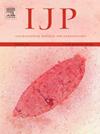旋毛虫胞外囊泡诱导体外抗炎和调节免疫反应。
IF 3.2
2区 医学
Q1 PARASITOLOGY
引用次数: 0
摘要
旋毛虫通过其排泄-分泌(ES - L1)产物诱导免疫调节机制,不仅调节宿主自身的免疫反应,还调节宿主对外来或自身来源的旁观者抗原的免疫反应,从而减轻炎症性疾病。在ES L1的影响下,树突状细胞(dc)获得耐受性表型和诱导Th2和调控反应的能力。由于ES L1产物是蛋白质和细胞外囊泡(tsev)的复杂混合物,本研究的目的是研究从ES L1产物中分离的tsev对dc表型和功能特征的影响,并阐明tsev是否可以复制完整ES L1产物的免疫调节作用。单核细胞来源的dc经tsev处理后获得半成熟表型,其特征是人白细胞抗原-DR同型(HLA-DR)、分化聚类(CD) 86 (CD86)和CD40的低表达,CD83和C-C趋化因子受体7型(CCR7)的适度表达,耐受性标志物吲哚胺2,3-双加氧酶1 (IDO-1)和免疫球蛋白样转录物3 (ILT3)的表达增加,同时IL-12和IL-23的产生不变。与对照组相比,IL-10和转化生长因子(TGF)-β的产生升高。tsev处理的DC基因表达分析显示mTOR、Ahr、NF-κB2、RelB、SOCS1和SOCS3水平升高,这些信号通路参与DC成熟和随后的抗炎和促炎细胞因子释放调控。tsev促进了dc驱动Th2极化和抗炎反应的能力,并削弱了它们诱导Th1/Th17极化的能力。此外,tsev处理的dc具有诱导常规FoxP3+调节性T细胞和非常规T调节性(Tr1)细胞的高能力。即使在促炎刺激刺激后,tsev处理的dc的耐受性仍保持不变。这些发现强调了tsev诱导免疫耐受的潜力,表明它们可能用于治疗炎症性疾病。本文章由计算机程序翻译,如有差异,请以英文原文为准。

Trichinella spiralis extracellular vesicles induce anti-inflammatory and regulatory immune responses in vitro
The helminth Trichinella spiralis, through its excretory-secretory (ES L1) products, induces immune regulatory mechanisms that modulate the host’s immune response not only to itself, but also to bystander antigens, foreign or self in origin, which can result in the alleviation of inflammatory diseases. Under the influence of ES L1, dendritic cells (DCs) acquire a tolerogenic phenotype and the capacity to induce Th2 and regulatory responses. Since ES L1 products represent a complex mixture of proteins and extracellular vesicles (TsEVs) the aim of this study was to investigate the impact of TsEVs, isolated from ES L1 products, on phenotypic and functional characteristics of DCs and to elucidate whether TsEVs could reproduce the immunomodulatory effects of the complete ES L1 product. Monocyte-derived DCs treated with TsEVs acquired semi-matured phenotypes, characterized by low expression of human leukocyte antigen – DR isotype (HLA-DR), cluster of differentiation (CD) 86 (CD86), and CD40, moderate expression of CD83 and C–C chemokine receptor type 7 (CCR7), and increased expression of tolerogenic markers indoleamine 2,3‐dioxygenase 1 (IDO-1) and immunoglobulin-like transcript 3 (ILT3), together with the unchanged production of IL-12 and IL-23, and elevated production of IL-10 and transforming growth factor (TGF)-β, compared with controls. Gene expression analysis of TsEV-treated DCs revealed elevated levels of mTOR, Ahr, NF-κB2, RelB, SOCS1 and SOCS3, which participate in signaling pathways involved in DC maturation and the subsequent regulation of release of both anti-inflammatory and pro-inflammatory cytokines. TsEVs promoted the capacity of DCs to drive polarization of Th2 and anti-inflammatory responses, and impaired their capacity to induce Th1/Th17 polarization. Moreover, TsEV-treated DCs possessed a high capacity to induce conventional FoxP3 + regulatory T cells, as well as unconventional T regulatory (Tr1) cells. Tolerogenic properties of TsEV-treated DCs were retained even after challenge with a pro-inflammatory stimulus. These findings highlight the potential of TsEVs to induce immune tolerance, suggesting their potential use as therapeutics for the treatment of inflammatory disorders.
求助全文
通过发布文献求助,成功后即可免费获取论文全文。
去求助
来源期刊
CiteScore
8.40
自引率
2.50%
发文量
76
审稿时长
23 days
期刊介绍:
International Journal for Parasitology offers authors the option to sponsor nonsubscriber access to their articles on Elsevier electronic publishing platforms. For more information please view our Sponsored Articles page. The International Journal for Parasitology publishes the results of original research in all aspects of basic and applied parasitology, including all the fields covered by its Specialist Editors, and ranging from parasites and host-parasite relationships of intrinsic biological interest to those of social and economic importance in human and veterinary medicine and agriculture.

 求助内容:
求助内容: 应助结果提醒方式:
应助结果提醒方式:


